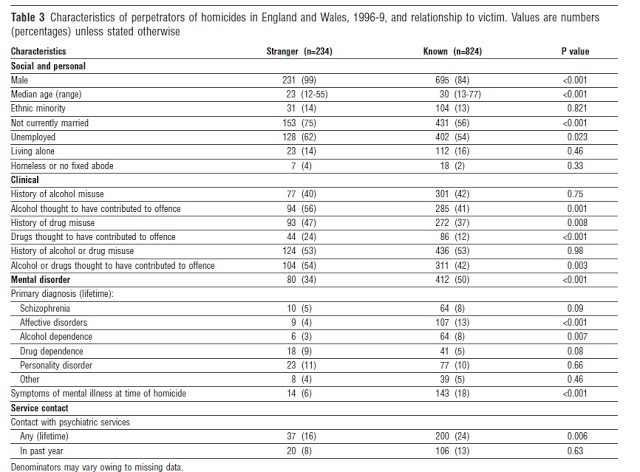In most cases of murder, the victim knows their attacker and there is a history of some form between them whether it is a family member, partner or former partner, or work colleague. Stranger murder; being killed by a person you have never met is in fact quite rare.
There have been a number of incidents where an individual has seemly killed someone randomly, in the street, in a shop, or in their home with no clear motive. A shocking case in 2013 saw 31-year-old Joanna Dennehy kill three men within ten days of each other and brutally attack two strangers in the street in the Peterborough and Norfolk areas of England. Once in court, she said, “I killed to see how it felt, to see if I was as cold as I thought I was, and then it got moreish”.
Often after such brutal acts with no clear motive or explanation, the notion of mental illness appears, and should an offender have any history of mental ill health, this becomes their driving force. In 2013 The Sunday Mirror splashed “THREE people are killed by mentally ill every fortnight” across its pages. The Sun also in 2013 headlined “1,200 killed by mental patients” on its front page. Misinterpretation of statistics, making relationships that are not accurate, and essentially scaremongering the public to be terrified of anybody who has a mental illness appears to be the purpose of such media reporting.
Mental Illness and Violence
When there are cases of murder committed by a person with a mental illness it is understandable this will cause concern, particularly when the victim was a stranger to them. Furthermore, when it is reported that this individual was known to mental health services and had been an in-patient in psychiatric care facilities in the recent months before the incident, inevitably questions will be asked.
A case in 2009 is a prime example. Alan McMullan fatally stabbed pregnant Claire Wilson in Grimsby, North Lincolnshire after he was reportedly declined a bed in a psychiatric unit as doctors felt he was exaggerating his symptoms. A further case in 2013 saw similar circumstances when 13-year-old Casey Kearney was stabbed to death by Hannah Bonser aged 26. After the attack, it emerged that Hannah Bonser had been in contact with mental health services in the previous weeks asking to be admitted to a psychiatric unit as she had ‘voices in her head telling her to kill’.
These are the stories that make the headlines and what the public sees, adding to the idea that those with mental illness should be feared and avoided at all costs. Budget cuts within NHS mental health services are being targeted for blame with a reduction in services, support, and beds available to those who are mentally ill and in desperate need of support.
A push to keep more people in their homes and provide community home-based support has been slammed by some as inadequate and dangerous not only for the patient themselves but for their families and the general public. There is certainly no doubt that the UK’s mental health services are struggling under the strain of the services needed against the money they have to provide them.
Research into Stranger Murders and Mental Illness
A number of research studies have been carried out into mental illness and violence with a few looking specifically at the occurrences of stranger murder. A study from the School of Psychiatry and Behavioural Sciences at the University of Manchester has examined incidents of murder by perpetrators in England and Wales, who suffer from mental illness and where their victims were strangers.
This study examined such data for the period between 1967 and 1997 inclusive of the number of convictions for homicide in general, for stranger homicides, and the number of hospital orders involved in those cases. They found that stranger murders leading to convictions averaged 96 per year for this time period accounting for 18% of the total murders recorded. There is a common perception that we as individuals are more at risk from strangers doing us harm than from people we know, however, this is not the case.
In Scotland for example, in the period between 2002 and 2012 of the 211 females who were victims of homicide, 44% of them were killed by a current or ex-partner. Furthermore, only 9% of these cases were the result of murder by a stranger. Looking at the figures for male victims, 62% were murdered by someone they knew (6% by a current or ex-partner) and only 18% by a stranger. The Manchester University study also found drug and alcohol misuse to be a more significant factor in stranger murders than mental health issues, which it should be noted is the same for standard homicides and is not a unique issue to stranger murder.
The statistics gathered by this study allow for some interesting reading with regard to the profiles of those involved in stranger murders in the United Kingdom:
- In 99% of stranger murders, the perpetrator was male compared to 84% of non-stranger murders.
- In 68% of stranger murders, the perpetrator was between the ages of 18 and 30 years, much higher than for non-stranger murders where perpetrators were between these ages in only 47% of cases.

With regards to mental health and violence, the study found that only 5% of stranger murders carried out between 1996 – 1999 were committed by people diagnosed with schizophrenia with the most common diagnosis for those committing these crimes being personality disorder (11%) followed by drug dependence issues.
Overall, stranger homicides have increased during this period more than standard homicides have, however, the use of hospital orders under the mental health act did not see a similar increase, suggesting that the rise in stranger homicides is not directly related to those with mental illness.

Since the 1970’s convictions for murder in England and Wales have increased rising from 339 in 1970 to 618 in 1997. However, the services available to those with mental health problems have decreased due to funding cuts. News reports in 2013 highlighted the Birmingham and Solihull Mental Health NHS Trust has seen 13 murders by patients between 2010 and 2012. One horrific case which received much attention in the media was that of Phillip Simelane who stabbed 16-year-old Christina Edkins to death on a bus in Birmingham in a completely random and unprovoked attack.
Simelane had spent time in prison and suffered from mental health issues bringing him under the care of the NHS Trust. Released in December 2012 from in-patient psychiatric care despite recommendations against it he committed murder within 3 months. It has been suggested he was suffering from paranoid schizophrenia to such a level that he should not have been released from the hospital due to the risk to himself and others because of his psychosis.
The media are particularly bad at increasing the stigma of mental illness leading to violence. Articles suggesting mental illness is the root cause of violent and aggressive behavior are commonplace suggesting that innocent victims are being murdered by crazed strangers in the grips of psychosis on a regular basis.
The facts are quite different and while violence can be seen in those with mental illness there is no evidence to suggest such individuals pose a higher risk to society due to their mental illness. In fact, research suggests you are more likely to be attacked and killed by someone without a mental illness than someone with a mental illness.
- A Stranger Killed Katy: The True Story of Katherine Hawelka, Her Murder on a New York Campus, and How Her Family Fought Back “In the early morning hours of August 29, 1986, Clarkson University sophomore Katy Hawelka – bright, pretty and full of life – strolled back to her upstate New York campus after a night out. On the dimly lit path beside the university’s ice hockey arena, a stranger emerged from the darkness.”
- Dark Dreams: A Legendary FBI Profiler Examines Homicide and the Criminal Mind “Hazelwood has helped track down some of the most violent and well known criminals in modern history. The cases he describes are as shocking as they are perplexing; their resolutions are as fascinating as they are innovative.”



